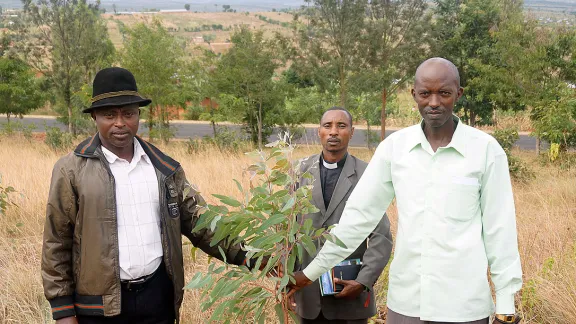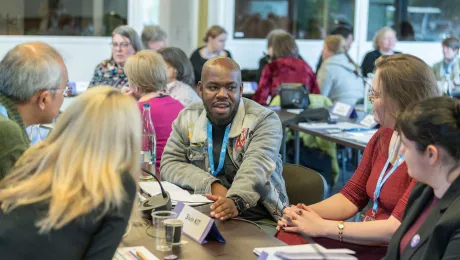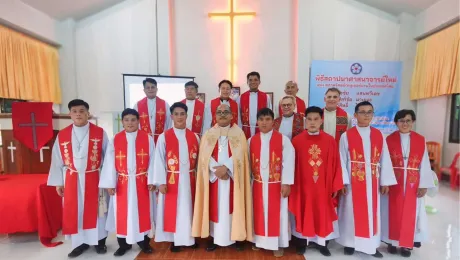
Tree plantation in the Matimba parish of the Evangelical Lutheran Church in Rwanda. Photo: LWF/J. Brummer
DMD Supported Project Provides Training in Income-Generating Saving and Credit Schemes
(LWI) – A project run by The Lutheran World Federation member (LWF) church in Rwanda with support from the Department for Mission and Development (DMD) has enabled church leaders and parishioners to establish saving schemes to finance schools, health centres and church buildings entirely through local resources.
The Lutheran Church in Rwanda (LCR) was officially founded on December 25 in 1994 by Rwandan returnees from Tanzania after the genocide, which led to the loss of about one million lives and the creation of 800,000 refugees and displaced people. The church started with just six pastors and some 2,000 members. Today membership has risen to more than 5,000 people and the LCR is active in most parts of the country.
The “Capacity Building for Sustainable Parishes” project, which started in 2009, provides training in saving and credit schemes, project planning and fundraising skills for LCR leaders and pastors in all of the church’s 17 parishes throughout Rwanda. This has resulted in the creation of saving groups run by women, young people and other parishioners for small income-generating schemes and larger construction projects, where the government usually provides the land and covers operating costs.
“Educating our parishes on local resources mobilization and leadership has been of great significance. It has led our church to positive transformation, said LCR Bishop Mugabo Evalister. “As I look back where we started and compare it with what I observe today, I see parishioners’ energy and commitment to build infrastructures such as schools and chapels by their own initiatives, and to me this means a lot for church growth.”
In addition, six parishes in Umutara district in Rwanda have mobilized local resources and labour for the construction of a resource center in Nyagatare. The center will be used for meetings and conferences, with the goal of generating income for the LCR.
The project targets marginalized and destitute women and youth by providing them with opportunities to improve their economic and social situations through saving and credit management skills. Between five to 10 saving and credit associations have been created in 17 parishes by women and youth leaders. After three years of saving and keeping small livestock such as pigs, chickens, rabbits and goats, group members have saved 30 % of their annual income.
“I want to thank my parish leaders for making me aware about joining a group for saving and lending as it restored my dignity as a woman,” said Sarafina Niyonsaba, a member of the Kibungo Parish Women’s Group. “I no longer spend my money on beer but save it. I applied for a loan, which enabled me to own four goats, and today my neighbors no longer disrespect me.”
“The Lutheran Church in Rwanda stands out as an example of a church that makes genuine efforts to achieve self-sufficiency. It illustrates that more than the infrastructure or financial means it is the attitude of people and their true commitment that makes a church grow and gain importance in its local context,” said Julia Brümmer, DMD program assistant to the secretary for Project Implementation and Monitoring, after visiting the LCR in June.
“In Rwanda, the commitment and will of the church leadership has carried along the members in the congregations and thereby empowered them to become agents of their own development,” she added.
The DMD-supported project has also increased community awareness of environmental issues aimed at helping the LCR become a partner in reducing soil erosion and pollution. Six tree nurseries have been planted in six parishes in order to develop greenbelts alongside church properties and parishioners’ homes, as well as provide a source of income.
“Two years ago when we started creating consciousness for generating resources locally, I did not understand how it was going to work,” said LCR District Pastor Rev. Theoneste Ruhinda. “But I’m happy today when I see how parishioners through their own resources and initiatives are able to build schools, churches, and many destitute women in parishes are saving the little they earn and lend among themselves for their wellbeing. God is great.”


